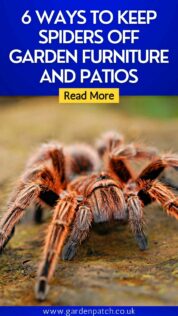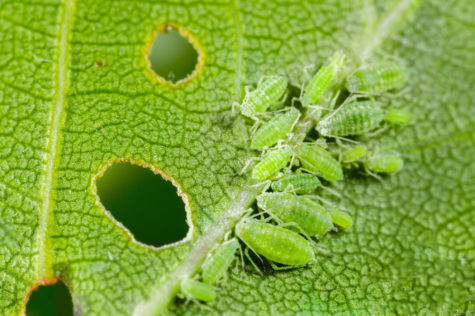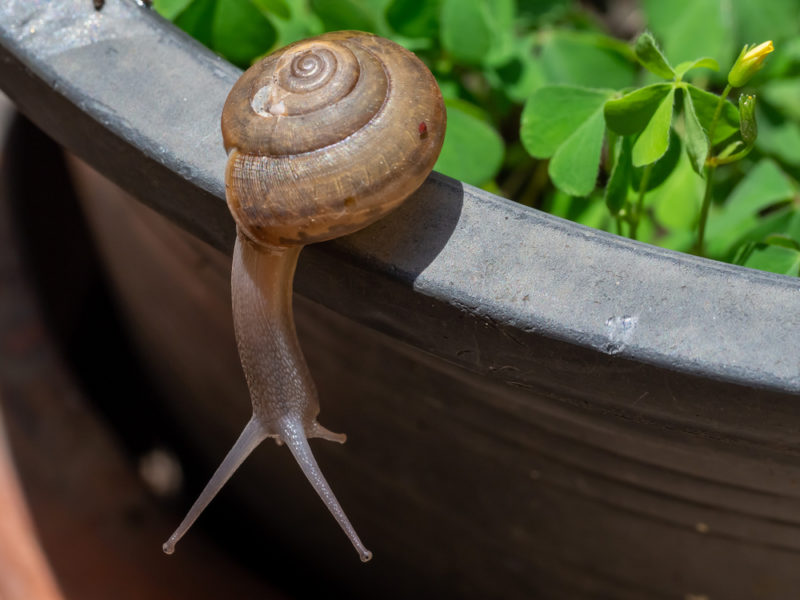Do you often find a spider or two relaxing along with you on your garden furniture? You’re not alone. For most of us, spiders give us the creeps, never mind that most of them are completely harmless and actually good for the environment.

Credit: Shutterstock
If that sounds like you, read on to find out how to make your garden time a more relaxing, spider-free experience.
How to keep spiders off garden furniture
Keeping spiders away from your garden furniture is fairly simple. All you have to do is clean regularly, remove any hiding spots, use repellents or use some other form of spider barrier or prevention technique.
Let’s take a look at exactly how to stop spiders on garden furniture.
1. Furniture choices
The type of furniture you choose will have a direct effect on the number of spiders and the amount of effort you’ll have to put in to remove them.
Wicker furniture is usually the worst choice of garden furniture if you don’t get along with spiders. They have lots of perfectly protected, dark holes and areas where a spider will live very happily despite your fear of them.

Wicker furniture is the worst choice for a spider-free garden. Credit: Shutterstock
If you don’t want to put in a lot of effort to prevent a spider infestation, rather avoid wicker furniture and go for something simpler like metal or open design wooden furniture. This way you’re reducing the number of hiding spots while still having great-looking furniture.
2. Remove any hiding spots
Spiders prefer messy areas with lots of holes and dark areas to hide in. If your pot plants or vines are taking over the area around your garden furniture, they will create the perfect hiding spots for spiders. Any unnecessary garden tools and kid’s toys left lying around will also contribute to the perfect arachnid-friendly environment.
To reduce or even completely remove the number of spiders taking over your garden furniture, start by tidying up the area around them. Pack away any children’s toys, pool noodles or garden equipment. Here are some storage ideas to keep things tidy.
Trim any large shrubs or vines growing nearby and move any potted plants that can create hiding spots for spiders.
Make sure to give the area a good sweep or even hose it down to remove any dirt that may be attracting the spiders. Once you’re done, move on to cleaning the furniture itself.
3. Cleaning garden furniture
Your garden furniture, just like your indoor furniture, needs to be cleaned regularly. This involves dusting, vacuuming and sweeping underneath to remove any spiderwebs, eggs and debris that might lure in prey for the spiders.
Regularly cleaning your furniture will force spiders to work harder to rebuild their webs and nests every day which in turn will force them to migrate to a more hospitable area away from your furniture.

Keeping the garden clean makes spiders work harder. Credit: Shutterstock
You can also wash your garden furniture once every other week to flush out any spiders hiding in the crevices. Spiders are nocturnal so getting them to come out and move can be quite tricky during the day. Water will get the job done quickly flushing them out and forcing them to take shelter elsewhere.
You can also give your garden cushions a wash or beating quite regularly to dislodge any spiders that took up residence in the folds. Just make sure to do it out in the garden to prevent the spiders from simply running into another dark hole on a different piece of furniture.
4. Use spider repellents
If regular cleaning just doesn’t cut it and you’re still finding loads of spiders on your furniture every day, maybe it’s time to introduce some spider repellents into your daily or weekly spider prevention routine.
Here are a few options to look into:
Essential oils
It is possible to make your own spider repellent spray at home by using essential oils.
Spiders, like a lot of insects, hate the smell of citronella oil. You can mix it with a bit of water and spray it on, under or even around your furniture or you can use a citronella lamp to scare them away with the sweet-smelling smoke.

Citronella oil will keep spiders away. Credit: Shutterstock
It is also possible to use other oils like peppermint, citrus, or even cinnamon oil. Simply mix a few drops with some water, add it to a spray bottle and spray it all over.
Unfortunately, you will have to do this at least once a week since rain and other weather conditions may dilute the spider repelling properties of your solution.
Vinegar and pepper mix
Vinegar on its own is very effective for repelling spiders, but mixed with pepper it lasts a bit longer.
Vinegar can possibly damage your furniture over time so it’s best to first test the solution on an out of sight area. If you notice any discolouration, simply further dilute the solution or switch to a different one.
Commercial products
There are quite a few commercial products out there that function as both a repellent and a barrier.
They aren’t guaranteed to work 100% of the time, but if applied regularly you should see fewer spiders around. Make sure to reapply after rain.
Plants
There are a few plants you can grow either as a barrier or as a repellent for spiders. Peppermint is particularly good at this job.
All you have to do is plant some in a container and place it between your furniture or plant a whole row of peppermint all around your patio to prevent spiders from entering.

Plant some peppermint in containers to repel spiders. Credit: Shutterstock
Peppermint isn’t the only plant that works so do some research and you might even find a whole host of useful plants. Another plus, you can use these plants in your cooking most of the time!
5. Create a barrier
There are quite a few things you can create a very effective spider barrier with. As mentioned above, your first choice will most likely be to plant plants with spider repellent properties. If that’s not the way to go for you, you can also try the following:
Diatomaceous earth
Diatomaceous earth (DE) is a kind of powder that is excellent at killing pests. It works by cutting and dehydrating any insects that dare to crawl over it. DE works great sprinkled around your furniture or even the garden as long as it doesn’t get wet.

Diatomaceous earth is a toxic-free spider repellent. Credit: Shutterstock
There’s no danger to your pets or even babies if ingested making it ideal for pet and child-friendly gardens.
Cedarwood chips
Cedar is known for its pest repellent properties. It is often used in gardens as a mulch making it ideal to use around the area where you keep your furniture.

Use cedarwood chips as mulch and to keep spiders away. Credit: Shutterstock
Cedarwood chips look great as a ground cover which also hides the fact that you have a spider problem.
6. Reduce attractants
Another way to reduce the number of spiders on your furniture is to reduce the amount of light on your patio. Bugs like moths and mosquitos are attracted to artificial light which makes your patio a perfect hunting ground for spiders.
To reduce this problem and force them to hunt elsewhere, simply turn off the light when you’re not out there or change it to yellow light. Yellow light tends to attract fewer insects than normal white light does.
FAQs
How do I keep insects off my outdoor furniture?
To keep bugs away, make a natural pest repellent by using peppermint, citronella or eucalyptus essential oils, sprinkle some diatomaceous earth, or plant a few garden plants or herbs with pest repellent properties. It is always best to use a combination for the best effect.
What smells do spiders hate?
Spiders can’t stand the smell of citrus, peppermint, eucalyptus, citronella or tea tree oil. They also despise vinegar and cinnamon so these are also excellent options to repel spiders.
When you kill a spider does it attract other spiders?
No, spiders aren’t attracted by their dead brethren. When you do kill a spider, however, you open up a territory that will soon be filled by another spider if you don’t take the time to find a spider repellent or barrier that works for you.

Save this pin for later






